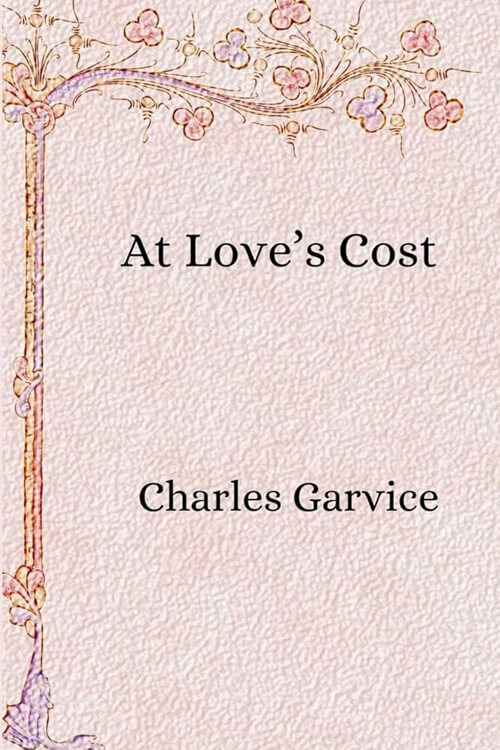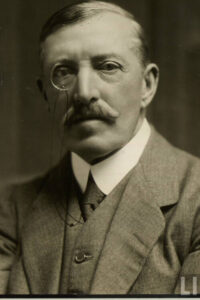
At Love’s Cost
“Until this moment I have never fully realized how great an ass a man can be. When I think that this morning I scurried through what might have been a decent breakfast, left my comfortable diggings, and was cooped up in a train for seven hours, that I am now driving in a pelting rain through, so far as I can see for the mist, what appears to be a howling wilderness, I ask myself if I am still in possession of my senses. I ask myself why I should commit such lurid folly. Last night I was sitting over the fire with a book—for it was cold, though not so cold as this,” the speaker shivered and dragged the collar of his overcoat still higher—”at peace with all the world, with Omar purring placidly by my side, and my soul wrapped in that serenity which belongs to a man who has long since rid himself of that inconvenient appendage—a conscience, and has hit upon the right brand of cigarettes, and now—”
He paused to sigh, to groan indeed, and shifted himself uneasily in the well-padded seat of the luxurious mail phaeton.
“When Williams brought me your note, vilely written—were you sober, Stafford?—blandly asking me to join you in this mad business, I smiled to myself as I pitched the note on the fire. Omar smiled too, the very cigarette smiled. I said to myself I would see you blew first; that nothing would induce me to join you, that I’d read about the lakes too much and too often to venture upon them in the early part of June; in fact, I had no desire to see the lakes at any time or under any conditions. I told Omar that I would see you in the lowest pit of Tophet before I would go with you too—whatever the name of this place is. And yet, here I am.”
The speaker paused in his complaint to empty a pool of water from his mackintosh and succeeded—in turning it over his leg.
He groaned again and continued.
“And yet, here I am. My dear Stafford, I do not wish to upbraid you; I am simply making to myself a confession of weakness which would be pitiable in a stray dog, but which in a man of my years, with my experience of the world and reputation for common sense, is simply criminal. I do not wish to reproach you; I am quite aware that no reproach, not even the spectacle of my present misery would touch your callous and, permit me to frankly add, your abominably selfish nature; but I do want to ask quite calmly and without any display of temper: what the blazes you wanted to come this way round, and why you wanted me with you?”
Read or download Book
Charles Garvice
Charles Garvice (24 August 1850 – 1 March 1920) was a prolific British writer of over 150 romance novels, who also used the female pseudonym Caroline Hart. He was a popular author in the UK, and the United States and translated around the world. He was ‘the most successful novelist in England’, according to Arnold Bennett in 1910. He published novels selling over seven million copies worldwide by 1914, and since 1913 he was selling 1.75 million books annually, a pace which he maintained at least until his death. Despite his enormous success, he was poorly received by literary critics and is almost forgotten today.
Biography
Charles Andrew Garvice was born on 24 August 1850 in or around Stepney, London, England, the son of Mira Winter and Andrew John Garvice, a bricklayer. In 1872, he married Elizabeth Jones and had two sons and six daughters. Garvice suffered a cerebral hemorrhage on 21 February 1920 and was in a coma for eight days until his death on 1 March 1920.
Until recently not much has been known about Garvice’s personal life. The Oxford Dictionary of National Biography said “Little .. is known of his family origins and personal life. Obscurity envelops.” John Sutherland in the Companion to Victorian Literature said “Little is known of Garvice’s life.” In 2010, English freelance author and editor Steve Holland did an exhaustive search of baptismal records, genealogy databases, and census records to build a picture of his early life.
Garvice is buried in Richmond Cemetery. W. Somerset Maugham, who met him at The Garrick, described Garvice as “a modest, unassuming, well-mannered man. I am convinced that when he sat down to turn out another of his innumerable books, he wrote as one inspired, with all his heart and soul.”
Writing career
Garvice got his professional start as a journalist. His first novel, Maurice Durant (1875), was marginally successful in serialized form, but when published as a novel, it was a “dismal failure”. He concluded it was too long and too expensive for popular sales – this early experience taught him about the business side of writing. He would spend the next 23 years writing serialized stories for the periodicals of George Munro. Magazine stories included A Modern Juliet, Woven in Fate’s Loom, On Love’s Altar, His Love So True, and A Relenting Fate. The unexpected success of Just a Girl (1895) in America brought him attention in the UK and encouragement to resume his career as a novelist – from then on every novel he published became a best-seller in England. He reworked many of his magazine stories as novels, and by 1913, Garvice was selling 1.75 million books annually, a pace which he maintained at least until his death. Garvice published over 150 novels, selling over seven million copies worldwide by 1914. Just a Girl was filmed in 1916. According to Garvice’s agent Eveleigh Nash, Garvice’s books were as “numerous in the shops and on the railway bookstalls as the leaves of Vallombrosa.” He was ‘the most successful novelist in England’, according to Arnold Bennett in 1910.
In 1904, capitalizing on his wealth as a best-selling author, Garvice bought a farm estate in Devon, where he wanted to work the land in “the genuine, dirty, Devonshire fashion.” Like the characters in his novels, he romantically dreamed of a life happily ever after, lord of a country manor. He wrote about it in his one non-fiction book A Farm in Creamland.






